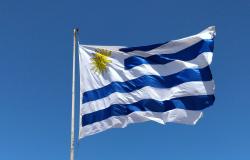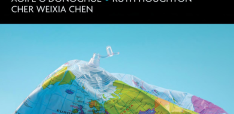The New Development Bank and Uruguay: A Win-Win Deal

This is part of in a new collection of commentaries from the Emerging Global Governance (EGG) Project on the New Development Bank's evolution. Browse the series here. Alvaro Mendez argues that Uruguay’s accession to the NDB has numerous benefits for both the country and the Bank.
In July 2020, upon arrival the current president of the New Development Bank (NDB), Marcos Troyjo took the decision to recruit new members.
Such an expansion was on the cards from the Bank’s founding in 2014 and is prefigured in Article 2 of the Articles of Agreement, which authorizes the admission of new members beyond the five founders (Brazil, China, Russia, India, and South Africa).
The NDB’s first President, K.V. Kamath (2015-2020), was not dormant on the issue. Under his leadership, NDB officials had tried to spark expansion by putting out feelers to a range of countries about the possibility of joining the Bank. But success proved more difficult than expected, and the Bank members decided to wait until the founding period of consolidation was finished.
After the first five years of operations had passed smoothly, the Board of Governors (BoG) felt the time had come to take the risk of authorizing Senior Management to form a “Task Force” which could identify potential members in all the regions that are represented by the founding members.
Leslie Maasdorp, NDB’s Vice President and Chief Financial Officer, disclosed that they had relied on a three-pronged selection criterion where prospective members had to show: (1) a financial need for the Bank’s funds, consistent with its mandate to mobilize resources for sustainable development; (2) a firm commitment to multilateralism along with a sound sovereign credit rating to warrant the credibility of both its economic and political outlook; and (3) a disentangled political alignment in world politics that would cause no tensions with a founding member, particularly one in the same region, whose support is required to advance the membership (e.g. South Africa respecting Egypt; Brazil respecting Uruguay).[1]
Following these guidelines, the Bank held talks in early 2021 with Bangladesh, the United Arab Emirates (UAE), Uruguay, and Egypt. Negotiations were successful with each of these four countries, and in late 2021 they became the first cohort of non-founding members to join the Bank, expanding its membership by 80% in one go, in terms of total country-members.
This commentary examines the admission of Uruguay to the NDB as a prospective member in September 2021, the first case of NDB organizational expansion and evolution in Latin America and the Caribbean (LAC).
The NDB is hoping that new members like Uruguay will expand the Bank’s base level of funding, extend its financial influence, and raise its international profile.
Montevideo, for its part, hopes that membership will facilitate cooperation with the NDB’s founding members, particularly Brazil and China, and provide access to funds for interconnectivity projects for deeper regional integration in South America and for optimizing cross-border capital flows and investment within the region and across regions.
In the case of Uruguay and the NDB, we see two logics at work behind the expansion of the membership of the NDB as an International Governmental Organization (IGO): first, the logic of attraction, when the organization’s merits attract candidate members without any solicitation, and the impetus to expand is external, located in the candidates; and second, the logic of prescription, when the onus of the decision to admit is internal to the organization’s incumbent members, and the organization decides its own preferences for the non-members seeking admission. The two logics may work simultaneously, as seen in the case of the NDB and Uruguay.
The NDB & Uruguay – a Win/Win Deal
Uruguay matched the three-pronged criterion of the NDB Task Force on membership expansion.
Uruguay fits the bill of the first prong -- a legitimate need to finance sustainable infrastructure projects to meet its development mandate. Montevideo urgently needs to overhaul and further develop its outdated and inadequate infrastructure which is a hindrance to the country’s ambition to become a regional trade/investment hub and the “gateway to Latin America”.[2] Uruguay’s substandard infrastructure stems from low levels of public investment: just 1.8% of GDP per annum. By contrast, the latest Inter-American Development Bank (IDB) recommended annual public investment for LAC is 3.12% of GDP at the very least.
For Montevideo, it is not viable to self-finance the increase in public investment in infrastructure when considering the country’s high public indebtedness and fiscal deficit. Successive Administrations have adopted very conservative public debt management policies. As the IMF highlights, the country has relied heavily on public-private partnerships (PPPs) to fund infrastructure. Multilateral development banks (MDBs) such as the NDB aim to foster PPPs by offering concessional loans to incentivize private investors to “crowd-in”, as lower interest rates help to de-risk infrastructure projects.
Uruguay also matches the second prong -- countries with a firm commitment to multilateralism and a sound sovereign credit risk rating.
Uruguay has a long history of leadership and commitment to MDBs in particular. It joined the World Bank as early as 1946, and was a founding member of the Inter-American Development Bank (IDB) in 1959. It was one of five founding members of FONPLATA-Development Bank in the early 1970s, and, again, in CAF in 2001. In April 2020, Uruguay became a full member of the Asian Infrastructure Investment Bank (AIIB).
It should also not go unnoticed that the NDB can also trace some of its own roots to LAC. The NDB constitution was signed in Brazil in 2014, and elements of the Bank’s design, including some of its provisions for membership expansion, were inspired by the Development Bank of Latin America (CAF). To quote former NDB President K.V. Kamath, in a discussion with the author in October 2018: “Without CAF we would not have the NDB”. This link to the history of multilateralism in the LAC region also played favourably into Uruguay joining the NDB.
Complementing its commitment to multilateralism, Montevideo has a sovereign credit risk rating of BB, which demonstrates a strong capacity to honour debt obligations.[3] Uruguay is one of the most stable economies in LAC and one of the strongest democracies in the world. These governance traits and relatively low levels of corruption, together with a strong political culture, make Uruguay a country of low political and policy risk, and an ideal candidate for NDB membership.
Joining the NDB provides Uruguay with a further multilateral platform to amplify its international voice among developing countries and emerging economies across the global South in matters of international finance.
Finally, Uruguay also fits the third prong -- countries with a disentangled political alignment that will not antagonize any NDB founding member. Montevideo has an excellent relationship with all members, especially China and Brazil. The relationship with China matters a great deal of course, and Uruguay could not have a better one: China has been Uruguay’s largest trading partner since 2013, and a “strategic partner” since 2016. Montevideo endorsed the Belt and Road Initiative in 2018.[4] But the geopolitical relationship with Brazil is the one that matters the most in this case, given that Uruguay and Brazil are next-door neighbours. The potential candidates for NDB membership must have the support of the founding member of the region where they are located.
It is fortunate that Montevideo has an outstanding relationship with Brasilia. In fact, the formal invitation to Uruguay to join the NDB came from Brazil in summer 2021. Brazil is Uruguay’s second-largest trading partner[5], and it counts Uruguay as its main political ally in Mercosur, the Southern Cone regional economic and political bloc founded in 1991, comprising Argentina, Brazil, Paraguay, and Uruguay.
Brazil publicly expressed its support for Uruguay’s long-standing ambition to conclude a Free Trade Agreement (FTA) with China, and despite Argentina’s vehement objection, citing the prohibition on bilateral trade negotiations by members of the Mercosur bloc and raising the spectre of an FTA leading to cheap Chinese products being dumped into the Southern Cone.
Negotiating Accession to the NDB: Uruguayan Diplomacy, Brazilian Support
Uruguay’s formal courtship of the NDB began during the period of K.V. Kamath’s Presidency. The Brazilian contingent in the Bank was most enthusiastic about adding new members such as Uruguay, believing that they would enhance the Bank’s international prestige and augment its financial capacity.
The Brazilians were especially positive about admitting states from LAC, knowing first-hand that the region has a keen interest in international financial institutions that are capable of providing funds for infrastructure development.[6]
As other scholars in this EGG collection have reported, the NDB sounded out many countries on the possibility of joining. Uruguay was one of them. The NDB even drew up a formal membership policy in 2017 in anticipation of inaugurating expansion in 2018, though the process was put on hold after internal disagreements arose over the timing.
But the pause in the process of NDB expansion did not dampen the enthusiasm of Montevideo for acceding to the newest multilateral lenders, the AIIB and the NDB. Uruguay’s interest in both can be traced to a State Visit to Beijing by Uruguay’s then-President Tabaré Vasquez in October 2016. The two new China-backed MDBs were put on Uruguay’s radar screen by its astute and seasoned Ambassador to China, Fernando Lugris, who had been his country’s ears and eyes on the ground since 2015.[7]
With the expansion of the NDB blocked by the BRICS founders’ decision to not expand during the period of consolidation, the Uruguayan government focused on the AIIB, which it joined as a full member in April 2020. However, behind the scenes, Uruguayan diplomats continued to probe for an opening to the NDB. Mario Vergara, then-President of Uruguay’s Central Bank, travelled to Shanghai in April 2018 to pay a courtesy call to the NDB, at which he underscored to Bank officials his country’s continuing interest in membership, notwithstanding the fact that the NDB was not accepting new members at the time.[8] The meeting in Shanghai went well, partly due to the support of NDB officials from Brazil who understood Uruguay's macroeconomic situation and the importance of such new members for the NDB’s future success in the world.[9]
The issue of membership expansion would remain dormant for two more years until the arrival of a new NDB President, Marcos Troyjo of Brazil, in July 2020. Soon after taking office, Troyjo announced that membership expansion would be a top priority.
Troyjo’s deep knowledge of Uruguay and awareness of its suitability for the NDB further helped the case for Uruguay’s membership. As a high-ranking Brazilian official, he had previously worked closely with Uruguayan negotiators to iron out many details in the EU-Mercosur Trade Agreement. In this capacity, Troyjo had developed a certain respect and appreciation for Montevideo. He was seen as “a good friend of Uruguay” in its policy-making circles.[10]
Uruguayan policy-makers wasted no time after Troyjo became the NDB president. Azucena Arbeleche, Uruguayan Minister of Finance and Economics (MEF) personally telephoned Troyjo to congratulate him on the appointment[11], and the conversation led to an impromptu ‘heart-to-heart’ discussion about Uruguay’s interest in joining the NDB. Having been the first-ever Uruguayan Governor of the AIIB and a distinguished academic economist who had also served in the public sector. Arbeleche had a unique standing to convey the country’s continuing interest in the NDB by the new Uruguayan President Lacalle Pou who had been inaugurated only a few months earlier.
The support from Troyjo and Arbeleche behind the scenes, and the interest of high-level Uruguayan officials in joining the NDB, meant that Uruguay was quickly identified by the Bank’s Membership Expansion Task Force as a potential and even an ideal member of the NDB in early 2021. Uruguayan policy-makers reacted enthusiastically to this news.
Potentially emblematic of new global South norms of Southern multilateral membership accession, the negotiation process between the NDB and Uruguay was not as rigid as the procedural norms in the multilateral institutions of the North. The accession process initially commenced via informal unstructured talks and consultations between NDB, Uruguayan and Brazilian officials during the first quarter of 2021. These informal consultations sometimes took place on the side-lines of major international forums hosted by China, such as the Boao Forum for Asia in April 2021, and at other times via WhatsApp (even at the highest governmental levels). This effective combination of informal and formal discussions reflected the ideal negotiating environment created by the rapport between Troyjo and Arbeleche.
In mid-May 2021, the NDB called on Uruguayan Ambassador Fernando Lugris to convey to Montevideo that the Bank would be willing to issue an official invitation to Uruguay to join, if Uruguayan authorities would submit a formal written letter of expression of interest addressed to the BoG of the NDB. Uruguay wasted no time and submitted its official letter to the NDB, signed by Arbeleche, on 31 May 2021. Just days later, on 3 June 2021, the Bank responded with an official invitation stating: “We are confident that both Uruguay and the NDB would benefit from the new partnership”.[12]
The official negotiations started with determining the indicative terms and conditions of Uruguay's membership, and how much of the respective subscription (paid-in and callable) of capital stock and member-share that Montevideo would hold in the NDB. This negotiation process ended on 5 August 2021 when the NDB BoG approved the formal admission of Uruguay as a prospective member.[13] The exact amount of Uruguay’s subscription has yet to be publicly announced. But on 2 September 2021, NDB president Troyjo and the Uruguayan government (represented by Arbeleche) issued a joint communique announcing Uruguay's acceptance into the NDB. Future research will track the details of Uruguay’s subscription to the NDB, and its share of votes on the Boards of the NDB.
In summary, Uruguay’s accession to the NDB has numerous win-win benefits for both the country and the Bank. It is heartening other countries in LAC, helping them believe that they may also find acceptance. Argentina recently announced its interest in joining the BRICS grouping, and already its bid is being backed by Brazil and China. The comprehensive involvement of Brazil in Uruguay’s candidacy has brought the NDB much nearer to the region, potentially making its Americas Regional Office, which opened in São Paulo in 2020, a bridge to Shanghai for the expansion of South-South multilateralism into LAC.
Alvaro Mendez is a Senior Research Fellow at the London School of Economics and Political Science (LSE), as well as the co-director of the Global South Unit at LSE-IDEAS. He is an Adjunct Professor at Sciences Po Paris and Fudan University. Dr. Mendez is also an Associate Fellow of the Geneva Centre for Security Policy (GCSP). He is the author, co-author, or editor of seven books: Colombian Agency and the Making of US Foreign Policy (2017); The China-Latin America Axis (2018); La Conexión China en la Política Exterior del Perú (2019); New Development Assistance (2020); The Political Economy of China–Latin America Relations (2020); Nuevas Relaciones Diplomáticas entre Panamá y China (2021); and China and Latin America: Development, Agency, and Geopolitics (with Chris Alden – in press). He has published articles in such journals as Geopolitics, Journal of Business Research, Sustainability, and Global Policy. His latest work is soon to be published in Foreign Policy Analysis.
Credit: Photo by Guilherme Hellwinkel on Unsplash
Endnotes
[1] Interview by author with Leslie Maasdorp, NDB Vice President and Chief Financial Officer: London-Shanghai (via Zoom), January 2022.
[2] Interview by author with a senior ranking Uruguayan diplomat involved in the membership negotiations with the AIIB: Undisclosed location (via Zoom), February 2022.
[3] EIU. Country Report: Uruguay (1st Quarter). Economist Intelligence Unit Country Reports 2022, 1-42.
[4] Mendez, A.; Forcadell, F. J., China y America Latina. Diplomacia, comercio y geopolítica. In América Latina Hoy, Estrada, G., Ed. Fundación Felipe Gonzales.: Madrid, Spain, 2022.
[5] Presidencia-Uruguay, Exportaciones uruguayas de bienes crecieron 43% en 2021 y alcanzaron los 11.549 millones de dólares (April 1, 2022). Source: Uruguay Presidency.
[6] Interview by author with German Rios, former Director of CAF in Uruguay, 2017-2019: London & Madrid (via Zoom), February 2022.
[7] Interview by author with a senior ranking Uruguayan diplomat involved in the membership negotiations with the AIIB: Undisclosed location (via Zoom), January 2022.
[8] Interview by author with Fernando Lugris, Uruguayan Ambassador to the People’s Republic of China since 2015: London & Beijing (via Zoom), May 2022.
[9] Interview by author with German Rios, former Director of CAF in Uruguay, 2017-2019: London & Madrid (via Zoom), February 2022
[10] Interview by author with Fernando Lugris, Uruguayan Ambassador to the People’s Republic of China since 2015: London & Beijing (via Zoom), May 2022.
[11] Interview by author with Fernando Lugris, Uruguayan Ambassador to the People’s Republic of China since 2015: London & Beijing (via Zoom), May 2022.
[12] Interview by author with Fernando Lugris, Uruguayan Ambassador to the People’s Republic of China since 2015: London & Beijing (via Zoom), May 2022.
[13] Interview by author with Fernando Lugris, Uruguayan Ambassador to the People’s Republic of China since 2015: London & Beijing (via Zoom), May 2022.


